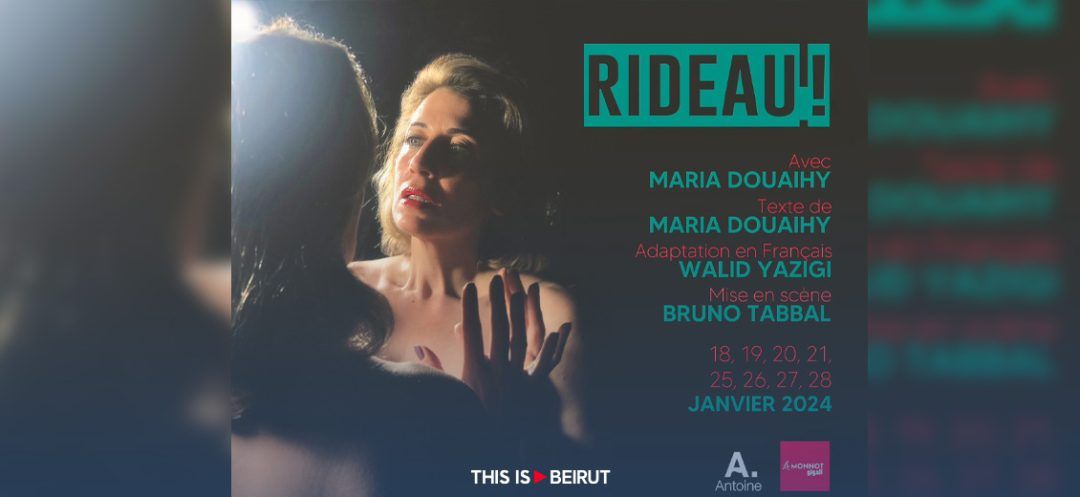
Rideau (Curtain) is a French adaptation by Walid Yaziji of a play originally written in Lebanese by Maria Douaihy and directed by Bruno Tabbal. The play will be performed at Le Monnot theater starting January 18.
Bruno Tabbal and Maria Douaihy share their excitement about their project, Rideau, coming to life on stage. Bruno Tabbal begins recounting the journey, "The project is a deeply personal text written by Maria Douaihy. Performed over a year ago, it left a significant mark on the ACT theatre stage. Originally in Arabic, Maria was keen to replay it in French, believing that this language would add an extra dimension to the text. Consequently, she decided to have it adapted by Walid Yaziji, a mutual friend of Maria and myself. He had previously written the script for Cocktail Maison in 2022, a play I had directed."
Bruno Tabbal overflows with praise for the text, "This text, both deep and witty, is not easy to interpret. Directing it posed a significant challenge for me. Maria got in touch with me in summer, informing me that Walid Yaziji had translated the text into French, and she wanted me to take on this new direction. I was immediately enthusiastic upon the first reading, greatly admiring Maria's talent as an actress. For many years, she sacrificed her career for her children and family. Now that her children are more independent, she can revive her passion. This is how Rideau was born. Now, we are less than two weeks away from its premiere."
Bruno articulately addresses the artistic challenges, "The main challenge of directing this play was to create captivating dynamics and visual contributions to accompany a one-hour monologue. Avoiding a static or monotonous outcome is crucial. The complexity of working on a monologue lies here. My goal was to present something completely different, supporting and propelling the text into another dimension."
Regarding the language, he finds it a source of inspiration, "The play, now in French, undergoes a radical transformation. Language is more than mere words; it embodies a culture. With Cocktail Maison, we played on the franco-lebanese aspect. However, in Rideau, French takes on a more universal dimension. The challenge was to personalize this French text to reflect the culture and society of the character, while maintaining a universal appeal, despite French not being the primary language in Lebanon. The play is intense, deep and nuanced. Already rich in Arabic, it gains even more dimensions and layers in French. I am convinced it will appeal to the audience, as it delves deep into pain and a wide range of emotions."
Elaborating on his collaboration with Maria Douaihy, Bruno Tabbal states, "This isn't our first collaboration. Our initial partnership dates back to our university days. Therefore, my bond with Maria is both sentimental and privileged. I have always believed in her talent, and it was I who brought her back to the stage with Cocktail Maison. Since then, she has performed in several plays, which delights me as I know she deserves to be on stage. Working again with Maria was a natural step for me, continuing our relationship that is both human and artistic."
Maria Douaihy highlights the richness of the French language as well: "For me, the French language is an integral part of our identity. We have learned and practiced it since childhood. Despite its less frequent use in recent years, it remains an important part of our cultural heritage. Contrary to what some may believe, the use of French is not limited to a certain social class. Previously, most people preferred English, but French has always held a special place in my heart. This language has contributed significantly to our understanding of art, music and cinema. The works I have written in French significantly differ from those in Arabic, offering a broader range of richness and diversity in ideas."
For Maria, "transposing a text into French gives it an additional dimension, sometimes providing a humorous or poetic perspective to ideas and situations that might have been more understated in their original form. This linguistic transformation is an aspect I particularly enjoyed." On the impact of changing the language and adapting the original Lebanese play into French, she notes, "The change in language also transforms the characters, bringing them closer to a more tangible reality. Hence, in transitioning from Arabic to French theatre, we shifted the setting, for example, from a living room to a bedroom, adding dynamism and variation to the performance."
Mentioning her experience with Bruno Tabbal, she states, "Working with Bruno, a longtime friend with whom I share artistic and human affinities, and who was also the first person I acted with, has been a profoundly enriching experience. He knows exactly what he wants and allows considerable freedom to the actors, offering ample space for personal expression and improvisation. I am incredibly excited about this experience, as I am eager to discover how, by changing the language, we can create two distinctly different experiences."
Instagram:
med at ACT's Le Monnot Theater starting January 18, 2024.
Read more



Comments